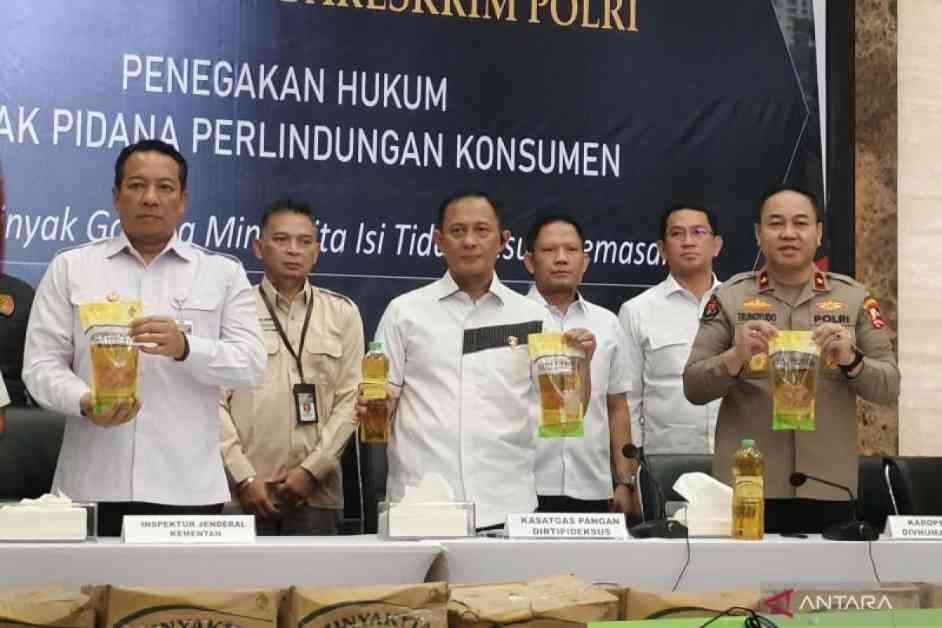The MinyaKita Oil Fraud Scandal Unveiled
In a recent development, the Directorate of Special Economic Crimes of the National Police Criminal Investigation Unit has identified a key suspect in the MinyaKita case, shedding light on a fraudulent scheme where subsidized cooking oil fell short of the government-mandated volume standards.
The suspect, known by the initials AWI, serves as the branch head and manager of PT AYA Rasa Nabati, a company responsible for packaging and distributing various brands of cooking oil, including MinyaKita. The revelation came to light during an inspection at the Lenteng Agung Market in South Jakarta, where authorities discovered discrepancies in the oil measurements.
On the following day, investigators paid a visit to PT AYA Rasa Nabati’s facilities in Depok, West Java, where they uncovered oil packaging machines calibrated to dispense 802 milliliters and 760 milliliters, deviating from the standard requirements. Brigadier General Helfi Assegaf, the Director of Special Economic Crimes and Head of the National Police Food Task Force, highlighted that AWI manually adjusted the oil quantities in each package, raising suspicions of foul play.
AWI, who has been in operation since February 2025, boasted a production capacity ranging from 400 to 800 cartons of cooking oil per day. The suspect reportedly sourced bulk cooking oil raw materials from PT ISJ through a trader in the Bekasi area, at a cost of Rp18,100 per kilogram (equivalent to US$1.08). Furthermore, AWI procured bottle and pouch packaging from PT MGS in Bekasi City, with prices set at Rp930 (US$0.06) per bottle and Rp680 (US$0.04) per pouch.
Following a thorough investigation, authorities seized a significant amount of evidence, including 450 boxes containing MinyaKita in pouch packaging, ready for distribution, as well as 30 pouch-filling machines, 40 bottle-filling machines, and 80 oil storage drums each capable of holding 1,000 liters. Assegaf revealed that a total of 10,560 liters of cooking oil were confiscated as evidence of the fraudulent activities.
The scandal deepened when officials uncovered that MinyaKita cooking oil, labeled as one liter, actually contained only between 750 and 800 milliliters, raising concerns about consumer protection and fair trade practices. Not only did the oil fail to meet the required volume standards, but it was also sold at a price exceeding the government-set highest retail price (HET). Despite the packaging indicating a price of Rp15,700 (US$0.95) per liter, consumers were charged Rp18,000 per liter, further exacerbating the fraudulent nature of the operation.
Expert Insights on the MinyaKita Scandal
In light of the unfolding MinyaKita Oil Fraud Scandal, industry experts and consumer advocates have voiced their concerns regarding the implications of such deceptive practices on public health and trust in the market. Renowned economist Dr. Maria Tan shared her perspective on the issue, emphasizing the need for stricter regulatory measures and increased transparency in the food industry.
Dr. Tan highlighted the significance of upholding quality standards and ensuring that consumers are protected from fraudulent activities that compromise their well-being. She underscored the importance of government oversight and industry accountability in maintaining the integrity of essential goods such as cooking oil, which play a crucial role in daily life.
As authorities continue to investigate the MinyaKita case and hold the perpetrators accountable, it is essential for consumers to remain vigilant and informed about the products they purchase. By staying informed and advocating for transparent practices in the food industry, individuals can contribute to a safer and more ethical marketplace for all.
In conclusion, the MinyaKita Oil Fraud Scandal serves as a stark reminder of the importance of regulatory oversight and consumer protection in the food industry. As authorities work to uncover the full extent of the fraudulent activities and bring the responsible parties to justice, it is crucial for stakeholders to prioritize transparency, integrity, and accountability in order to safeguard public health and trust.






















